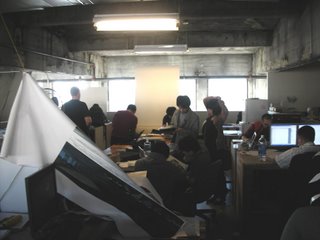 Last saturday students from Tsukuba University outside of Tokyo and ETH from Switzerland joined my studio for a one week workshop; we are investigating housing types of Los Angeles. The presentation of the proposal for a new typology will be tomorrow morning.
Last saturday students from Tsukuba University outside of Tokyo and ETH from Switzerland joined my studio for a one week workshop; we are investigating housing types of Los Angeles. The presentation of the proposal for a new typology will be tomorrow morning.Along with the housing project, I'm also back to work on the City of Women in Mumbai. Today I'm working on the agriculture district of the city. There's a very good project that is being developed and planned called the vertical farm. It is what it sounds like, a farm in a skyscraper; it produces enough food to feed 50,000 people. Read about the urban farms!

1 comment:
Howdy, I learned of your blog from one called 'Mid-Term'. 'e thought I might be interesting for us to communicate, so I guess here goes nothing.
The vertical farm project (concept?) is very interesting. Urban agriculture is a wonderful idea, possibly the only concept that can sustainably support our massive modern cities.
I wonder about the effectiveness of a massive farm skyscraper for feeding 50,000 people. Small numerous gardens can be easily built into existing infrastructure. Small indoor gardens at south facing windows and outdoor projects such as community gardens or the WWII victory gardens. Have you seen the film about cuba surviving peak oil? http://www.communitysolution.org/cuba.html
I would also point out the the present economics for community (or urban) organic farming is very dire. Similar to the problem of inter-city affordable housing, family farming must again be a profitable and sustainable lifestyle.
Assuming our current economic system. It would be more affordable to clear wild land and grow on marginal land long before agricultural skyscrapers can provide a return on an investment. Of course, this reality frightens me and is reason to question our market's ability to assign value to things of true importance.
The large scale vertical farm is a grand idea, but it may be treating a symptom of a greater problem. I would be much more excited by projects that convert existing city structure to food production in a way that is affordable and maintainable by the local population and culture.
Take my ramblings for what they are (ideals of a disillusioned computer programmer and wanna-be farmer)
-e
Post a Comment